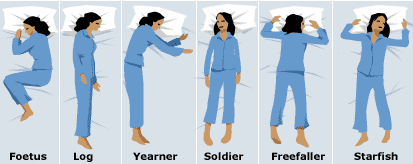What Are The Ideal Sleeping Positions For You?
Did you know that many researchers have claimed that the sleeping positon you adopt when sleeping actually can show your behaviour, characteristics and even your moods? Read on and learn some more on this facinating topic.
The Sleeping position is the one an individual adopts when asleep. The are many varied sleeping positions but the most common are as follows:
1) Fetal Position – The individual sleeps on their side and curl their bodies inwards to almost a C or D-shape or reverse C or D-shape dependent onto which side they sleep;
2) Soldier Position – As the name indicates, the person sleeps flat on their back with their hands to their sides;
3) Starfish Position – The person is again flat on their back, but this time their arms extend over and outwards above their heads and their legs are somewhat flayed outwards as well;
4) Freefall Position – In this position, the sleeping person lies on their stomachs with their arms in the vicinity of their head;
5) Log Position – Almost like the soldier position but the person lies on their side during sleep. Their hands are still at their sides
6) Yearner Position – Almost the same as the log position with the person on their side, but in this one the sleeper’s arms are outstretched in front of their bodies.
7) Dead Man’s float – Similar to the freefall position in that the individual is on their stomachs however the hands hold onto the pillow during sleep.
Various schools of thought have researched the most popular sleeping positions and even hypothesized on the resultant behavioral characteristics of the individual.
We have noted during our research that sleeping on one’s side i.e. Fetal Position or Log and sleeping on one’s back i.e. Starfish or Soldier are the most recommended.
Benefits and drawbacks:
- Fetal Position – In this position stress on your spine is eased and snoring is absent or significantly reduced. However over the long term it can have adverse effects on the promotion of wrinkles. Too much of a fetal pose can risk affecting breathing during sleep and causing aches and pains in your joints;
- Log Position – This position allows your back to be elongated, promotes fair breathing and therefore less snoring. This is the most recommended position for women during pregnancy as well;
- Starfish and Soldier – Allows clear breathing and thus the least snoring. With the proper pillow as a close ally, it will promote good posture during sleep and support spine, hips and shoulders. It also has been noted that it puts the least stress upon the skin of your face so can reduce the occurrence of wrinkles.


Follow Us!